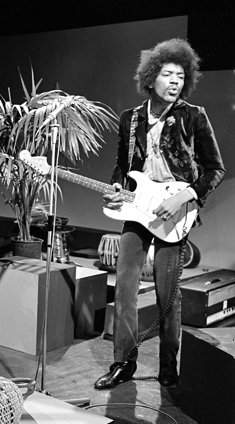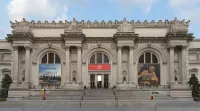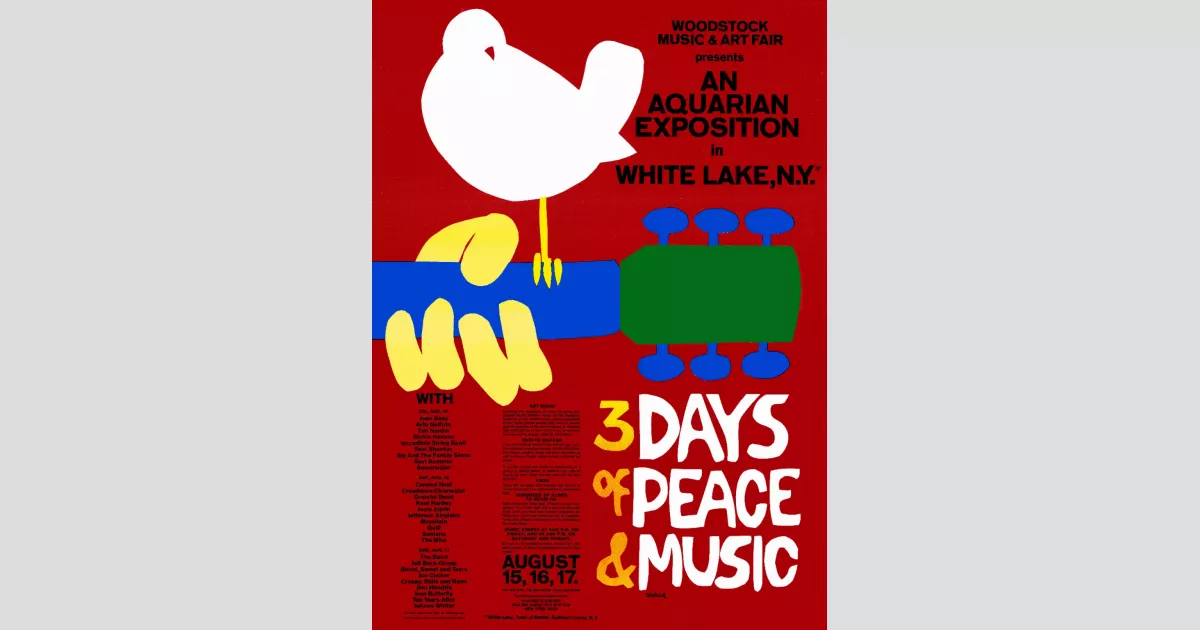The Woodstock Music and Art Fair, held on Max Yasgur's farm in Bethel, New York, from August 15-18, 1969, was a landmark music festival that drew over 460,000 attendees. Billed as "an Aquarian Exposition: 3 Days of Peace & Music," it featured 32 acts performing outdoors despite challenging weather. Woodstock became synonymous with the 1960s counterculture movement and remains one of the largest and most iconic music festivals ever held.
1966: Debut of the Peanuts Character Woodstock
Charles Schulz, the creator of the Peanuts comic strip, introduced the bird character Woodstock in 1966, later naming him after the festival as a tribute to its cultural impact.
January 1969: Formation of Woodstock Ventures
Woodstock Ventures was formed in January 1969 by Roberts, Rosenman, Lang, and Kornfield, with the initial idea of building a recording studio. This idea eventually morphed into the concept of the Woodstock festival.
April 1969: Creedence Clearwater Revival Signs On
Creedence Clearwater Revival became the first major act to sign a contract for the Woodstock festival in April 1969. Their commitment proved pivotal, encouraging other prominent artists to join the lineup.
September 1, 1969: Last Minute Permits and Approvals
Despite continued opposition, Woodstock organizers secured the necessary permits just days before the event. The approval came with the condition that all structures be removed by September 1, 1969.
September 1969: Jimi Hendrix Discusses Woodstock Performance
In September 1969, Jimi Hendrix held a news conference where he discussed his Woodstock set.
November 1969: Bethel Supervisor Amatucci Voted Out of Office
Following the Woodstock festival, Bethel Supervisor Amatucci, who played a role in bringing the event to the town, was voted out of office in November 1969.
1969: The Who's Performance at Woodstock
The Who's performance at the 1969 Woodstock festival became an iconic moment in rock history.
1969: Woodstock Music and Art Fair
The Woodstock Music and Art Fair, also known as Woodstock, took place from August 15 to 18, 1969, at Max Yasgur's farm in Bethel, New York. The event drew a massive crowd of over 460,000 attendees.
1969: Venue Challenges and Publicity
The organizers of Woodstock faced numerous venue challenges in 1969. Initially planned for Woodstock, the event was moved to Wallkill, then ultimately to Max Yasgur's farm in Bethel due to local opposition. Ironically, the publicity surrounding these relocations boosted the festival's notoriety.
1969: Original Woodstock Festival
The original Woodstock Music & Art Fair, a pivotal event in music history and counterculture, took place in August 1969.
1969: Woodstock Music Festival Takes Place
The original Woodstock Music and Art Fair took place in 1969.
March 1970: Release of the Woodstock Documentary and Financial Turnaround
The release of the Academy Award-winning documentary 'Woodstock' in March 1970 proved to be a financial lifeline for organizers Roberts and Rosenman, who were on the verge of bankruptcy after the festival. The film's success helped them recoup their losses and secure the rights to the valuable footage.
March 1970: Woodstock Documentary Saves Warner Bros
The release of the Woodstock documentary in March 1970 had a significant impact on Warner Bros. The film's success helped save the company from financial ruin during a difficult period.
April 1970: Publication of "I Remember, I Remember The Wondrous Woodstock Music Fair"
"I Remember, I Remember The Wondrous Woodstock Music Fair," a satirical poem about the festival by Frank Jacobs, was published in Mad magazine in April 1970.
1970: Release of the Woodstock Documentary
The documentary film about the Woodstock festival was released in 1970, further solidifying its place in music history.
1970: Woodstock Ventures Faces Lawsuits and Debt
Woodstock Ventures faced approximately 80 lawsuits, primarily from local farmers, following the 1969 festival. The movie's revenue funded settlements and covered the substantial debt.
1973: Max Yasgur Passes Away
Max Yasgur, who had leased his farm for the Woodstock festival, passed away in 1973.
1973: Summer Jam at Watkins Glen
The Summer Jam at Watkins Glen, held at the Watkins Glen International race track in 1973, drew an estimated 600,000 attendees, making it one of the largest music gatherings in history and setting a precedent for large-scale festivals at the location.
1973: Premiere of "National Lampoon's Lemmings"
The stage show "National Lampoon's Lemmings," which premiered in 1973, featured a satirical segment called the "Woodchuck" festival, parodying Woodstock and its performers.
1984: Placement of Woodstock Commemorative Plaque
A commemorative plaque was placed at the site of the original Woodstock stage in 1984.
1984: "Peace and Music" Monument Erected at Woodstock Site
Landowners Louis Nicky and June Gelish erected the "Peace and Music" monument, created by sculptor Wayne C. Saward, at the original Woodstock festival site in 1984.
1989: Impromptu 20th Anniversary Gathering at Woodstock Site
An impromptu gathering of approximately 20,000 people took place at the Woodstock site in 1989 to celebrate the festival's 20th anniversary.
August 1994: Woodstock: Three Days of Peace and Music Box Set Released
August 1994 saw the release of "Woodstock: Three Days of Peace and Music," a four-CD box set featuring tracks from the previous albums and additional unreleased performances.
August 1994: Jimi Hendrix: Woodstock Album Released
The album "Jimi Hendrix: Woodstock", featuring selected recordings of his performance at the festival, was released in August 1994.
August 1994: Woodstock: Music from the Original Soundtrack and More and Woodstock 2 Albums Released
Two soundtrack albums, "Woodstock: Music from the Original Soundtrack and More" and "Woodstock 2," were released in August 1994, featuring a selection of performances, stage announcements, and crowd noises.
1994: Release of "Woodstock: The Director's Cut"
A new version of the Woodstock documentary, "Woodstock: The Director's Cut," was released in 1994. This expanded version featured previously unseen performances by Janis Joplin, Jefferson Airplane, Jimi Hendrix, and Canned Heat.
1994: Woodstock Diaries Documentary Miniseries Released
In 1994, the three-part TV documentary miniseries "Woodstock Diaries", directed by D. A. Pennebaker, was released to commemorate the 25th anniversary of Woodstock.
1996: Woodstock Documentary Inducted into Library of Congress
The Woodstock documentary, a significant cultural artifact, was inducted into the Library of Congress's National Film Registry in 1996, ensuring its preservation.
1996: Purchase of the Woodstock Festival Site
The field and stage area of the original Woodstock festival were purchased in 1996 by Alan Gerry, a cable television pioneer, with the intention of preserving the site.
1997: Community Group Installs Welcoming Sign at Woodstock Site
A community group installed a welcoming sign for visitors at the Woodstock site in 1997, signaling a shift in the town's stance toward the festival.
July 1999: Live at Woodstock (Jimi Hendrix) Released
MCA Records released "Live at Woodstock," an expanded double-disc set of Jimi Hendrix's performance, in July 1999.
2004: Woodstock in Rolling Stone's 50 Moments That Changed Rock and Roll
In 2004, Rolling Stone magazine recognized the significance of Woodstock by ranking it as number 19 on their list of the '50 Moments That Changed the History of Rock and Roll'.
2005: Jimi Hendrix: Live at Woodstock Released
A two-disc set titled "Jimi Hendrix: Live at Woodstock", featuring all available footage of his performance, was released in 2005.
2005: Woodstock (poem) Publication
Argentine writer Edgar Brau published his long poem "Woodstock" in 2005, commemorating the iconic music festival.
July 1, 2006: Bethel Woods Center for the Arts Opening
On July 1, 2006, the Bethel Woods Center for the Arts, located near the original Woodstock festival site, officially opened with a performance by the New York Philharmonic.
August 2006: Crosby, Stills, Nash & Young Performance at Bethel Woods
Crosby, Stills, Nash & Young, a supergroup that embodied the spirit of the 1960s, performed at the Bethel Woods Center for the Arts in August 2006.
2006: Opening of Bethel Woods Center for the Arts
The opening of the Bethel Woods Center for the Arts in 2006 marked the beginning of a new chapter in the site's history, attracting visitors and contributing to the local economy.
January 2007: Woodstock (poem) English Translation Published
In January 2007, an English translation of Argentine writer Edgar Brau's long poem "Woodstock" was published by Words Without Borders. The poem, originally published in 2005, commemorates the Woodstock festival.
2007: Elliot Tiber's Account of the Woodstock Venue
Elliot Tiber, in his 2007 book 'Taking Woodstock,' claims to have played a key role in securing the final venue for the festival. However, his account is disputed by co-organizer Michael Lang and Max Yasgur's son, Sam.
June 2008: Opening of the Woodstock Museum
In June 2008, the Bethel Woods Center for the Arts opened a museum dedicated to the 1969 Woodstock festival, further solidifying its legacy.
June 2009: The Woodstock Experience Box Set Released
June 2009 marked the release of "The Woodstock Experience," a box set containing complete performances from Santana, Janis Joplin, Sly & the Family Stone, Jefferson Airplane, and Johnny Winter.
August 2009: Woodstock 40 Years On: Back To Yasgur's Farm Box Set Released
Rhino/Atlantic Records released a six-disc box set titled "Woodstock 40 Years On: Back To Yasgur's Farm" in August 2009, featuring more musical performances and ancillary material.
August 2009: 40th Anniversary Concert at Bethel Woods
The Bethel Woods Center for the Arts hosted a concert on August 2009, to celebrate the 40th anniversary of the Woodstock festival, featuring performances by artists who played at the original event.
October 2009: Live at Woodstock (Joe Cocker) Released
Joe Cocker released "Live at Woodstock" in October 2009, a live album of his complete Woodstock set, including previously unreleased tracks.
2009: Publication of "The Road to Woodstock"
"The Road to Woodstock," a book co-authored by Michael Lang, one of the festival's organizers, and Holly George-Warren, detailing the creation of the Woodstock Music & Arts Festival, was published in 2009.
2009: Woodstock 40th Anniversary Events
Numerous events took place worldwide in 2009 to commemorate the 40th anniversary of the Woodstock festival, including concerts and gatherings.
2009: "Taking Woodstock" Film Released
Taiwanese American filmmaker Ang Lee directed and produced the film "Taking Woodstock," released in 2009, which explores Elliot Tiber's role in bringing the festival to Bethel, New York.
2009: Release of Woodstock 40th Anniversary Edition
The 40th anniversary of the Woodstock festival was commemorated in 2009 with the release of an expanded edition of the documentary on DVD and, for the first time, Blu-ray.
March 18, 2010: Time Magazine Recognizes The Who's Woodstock Performance
Time magazine included The Who's 1969 Woodstock performance in its "Top 10 Music-Festival Moments" list on March 18, 2010.
August 2013: Richie Havens's Ashes Scattered at Bethel Woods
Richie Havens, who opened the 1969 Woodstock festival, had his ashes scattered at Bethel Woods Center for the Arts in August 2013.
May 2014: Announcement of Potential Woodstock 50th Anniversary Concert
In May 2014, Michael Lang, one of the original Woodstock organizers, announced plans for a potential 50th-anniversary concert to take place in 2019.
2016: Application for National Register of Historic Places
In late 2016, New York's State Historic Preservation Office submitted an application to the National Park Service to have the Woodstock festival site listed on the National Register of Historic Places.
February 2017: Woodstock Site Listed on National Register of Historic Places
In February 2017, the site of the 1969 Woodstock festival, including the performance area and adjacent campgrounds, was officially listed on the National Register of Historic Places.
2017: "Woodstock" Album Release
Inspired by a conversation about a Woodstock ticket stub, Portland-based rock band Portugal. The Man released their album titled "Woodstock" in 2017.
2017: "Coachella – Woodstock in My Mind" Release
Lana Del Rey released her song "Coachella – Woodstock in My Mind" in 2017. The song expresses her anxieties about global tensions, using Woodstock as a symbol of peace and reflecting a sense of nostalgia.
2017: Woodstock Site Listed on National Register of Historic Places
The site of the Woodstock festival achieved national recognition in 2017 when it was officially listed on the National Register of Historic Places.
2018: Bethel Woods Economic Impact Report
A report from Bethel Woods in 2018 highlighted the significant economic impact of the Woodstock legacy on the local economy, demonstrating its enduring influence.
2018: Confirmation of Bethel Woods 50th Anniversary Event
Plans for a 50th-anniversary event at the original Woodstock site, organized by the Bethel Woods Center for the Arts, were confirmed in late 2018.
January 9, 2019: Announcement of Official Woodstock 50th Anniversary Festival
On January 9, 2019, Michael Lang officially announced the Woodstock 50th anniversary festival, scheduled for August 16–18, 2019, in Watkins Glen, New York.
March 19, 2019: Woodstock 50 Lineup Announcement
The lineup for the planned Woodstock 50th anniversary festival was revealed on March 19, 2019, featuring a mix of artists who had performed at the original Woodstock in 1969 and contemporary acts.
April 29, 2019: Announcement of Woodstock 50's Cancellation and Subsequent Reinstatement Efforts
On April 29, 2019, investors announced the cancellation of Woodstock 50 due to concerns about the festival's preparedness, but organizers disputed the cancellation and sought alternative funding to salvage the event.
July 31, 2019: Cancellation of Woodstock 50
After a series of financial and logistical challenges, the Woodstock 50th anniversary festival was officially canceled on July 31, 2019.
August 2, 2019: Woodstock – Back to the Garden: The Definitive 50th Anniversary Archive Box Set Released
Rhino/Atlantic released the 38-disc "Woodstock – Back to the Garden: The Definitive 50th Anniversary Archive" on August 2, 2019, a comprehensive collection of nearly every note played at the festival.
August 8, 2019: Woodstock 50th Anniversary Stamp Dedication
On August 8, 2019, a ceremony was held at the Metropolitan Museum of Art in New York City to dedicate a Forever stamp commemorating the 50th anniversary of Woodstock. The ceremony included a performance of "The Star Spangled Banner" by "Captain" Kirk Douglas of the Roots, echoing Jimi Hendrix's iconic performance at the original festival.
August 2019: Woodstock 50th Anniversary Stamp Release
The United States Postal Service released a Forever stamp in August 2019 to commemorate the 50th anniversary of the Woodstock festival. The stamp, designed by Antonio Alcalá, was initially released at the Metropolitan Museum of Art in New York City.
2019: "Creating Woodstock" Documentary Released
"Creating Woodstock", directed by Mick Richards, was released in 2019, examining the festival's organization and featuring interviews with its producers.
2019: Live at Woodstock (Creedence Clearwater Revival) Released
An official album of Creedence Clearwater Revival's complete 11-song Woodstock performance, "Live at Woodstock," was released in 2019.
2019: "Woodstock: Three Days That Defined a Generation" Documentary Released
In 2019, Barak Goodman produced the documentary "Woodstock: Three Days That Defined a Generation", focusing on the festival's social and political context.
2019: Planned Woodstock 50th Anniversary Events
Multiple events were planned for 2019 to celebrate the 50th anniversary of the Woodstock festival, including a large-scale concert and events at the original site.
2023: Woodstock Festival in Pocheon Cancellation
In 2023, a South Korean organizer attempted to hold a Woodstock festival in Pocheon after acquiring the festival's license. However, the event was ultimately canceled due to insufficient preparation and subsequent controversies.
2023: Creedence Clearwater Revival's Woodstock Payment
In 2023, the equivalent value of Creedence Clearwater Revival's performance fee for Woodstock would be $83,000, highlighting the significant inflation that has occurred over time.
Mentioned in this timeline

Lana Del Rey born Elizabeth Woolridge Grant is a celebrated...

Jimi Hendrix was an American musician renowned for his extraordinary...

Inflation in economics signifies an increase in the average price...

News encompasses information about current events disseminated through various media...

The Metropolitan Museum of Art or the Met is a...
Portugal officially the Portuguese Republic occupies the Iberian Peninsula in...
Trending
53 minutes ago Kimberly Birrell faces Tatjana Maria in WTA Dubai 2026 first-round match.
3 hours ago Alaska Airlines Expands International Routes from St. Louis and Introduces New Spring Menus.

4 hours ago Mertens vs. Bouzkova: WTA Dubai 2026 Prediction, Odds, and Preview of the Match
4 hours ago Top Reliable Used Cars for Value in 2026: A Comprehensive Guide

54 minutes ago Janice Tjen Dominates Dayana Yastremska in Dubai WTA 2026 Round 1 Match
5 hours ago Linda Noskova Advances in WTA Dubai: Predictions, Betting Odds, and Tournament Info
Popular

Kid Rock born Robert James Ritchie is an American musician...
Randall Adam Fine is an American politician a Republican who...

Pam Bondi is an American attorney lobbyist and politician currently...

Barack Obama the th U S President - was the...
The Winter Olympic Games a major international multi-sport event held...

XXXTentacion born Jahseh Dwayne Ricardo Onfroy was a controversial yet...
